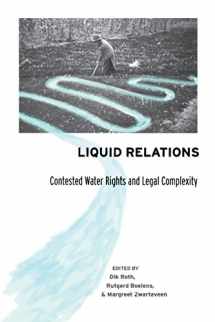
Liquid Relations: Contested Water Rights and Legal Complexity
ISBN-13:
9780813536750
ISBN-10:
0813536758
Edition:
None
Author:
Rutgerd Boelens, Dik Roth, Margreet Zwarteveen
Publication date:
2005
Publisher:
Rutgers University Press
Format:
Paperback
328 pages
FREE US shipping
Book details
ISBN-13:
9780813536750
ISBN-10:
0813536758
Edition:
None
Author:
Rutgerd Boelens, Dik Roth, Margreet Zwarteveen
Publication date:
2005
Publisher:
Rutgers University Press
Format:
Paperback
328 pages
Summary
Liquid Relations: Contested Water Rights and Legal Complexity (ISBN-13: 9780813536750 and ISBN-10: 0813536758), written by authors
Rutgerd Boelens, Dik Roth, Margreet Zwarteveen, was published by Rutgers University Press in 2005.
With an overall rating of 4.0 stars, it's a notable title among other
books. You can easily purchase or rent Liquid Relations: Contested Water Rights and Legal Complexity (Paperback) from BooksRun,
along with many other new and used
books
and textbooks.
And, if you're looking to sell your copy, our current buyback offer is $0.38.
Description
Water management plays an increasingly critical role in national and international policy agendas. Growing scarcity, overuse, and pollution, combined with burgeoning demand, have made socio-political and economic conflicts almost unavoidable. Proposals to address water shortages are usually based on two key assumptions: (1) water is a commodity that can be bought and sold and (2) “states,” or other centralized entities, should control access to water.Liquid Relations criticizes these assumptions from a socio-legal perspective. Eleven case studies examine laws, distribution, and irrigation in regions around the world, including the United States, Nepal, Indonesia, Chile, Ecuador, India, and South Africa. In each case, problems are shown to be both ecological and human-made. The essays also consider the ways that gender, ethnicity, and class differences influence water rights and control.In the concluding chapter, the editors draw on the essays’ findings to offer an alternative approach to water rights and water governance issues. By showing how issues like water scarcity and competition are embedded in specific resource use and management histories, this volume highlights the need for analyses and solutions that are context-specific rather than universal.


We would LOVE it if you could help us and other readers by reviewing the book
Book review

Congratulations! We have received your book review.
{user}
{createdAt}
by {truncated_author}


